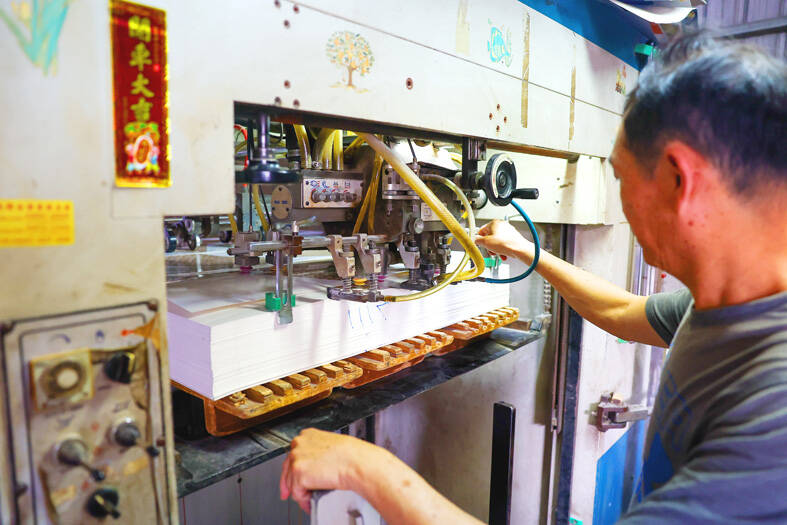An index gauging Taiwan’s manufacturing sector weakened significantly in March, hurt by the economic uncertainty created by US President Donald Trump’s tariff threats, the Taiwan Institute of Economic Research (TIER, 台灣經濟研究院) said yesterday.
The TIER’s economic composite index, which gauges the manufacturing sector’s health, fell sharply by 4.54 points from a month earlier to 12.12 in March, to enter the a yellow-blue spectrum of their system, indicating sluggish growth.
That compared with a yellow-red indicator seen in February and the yellow-blue shown in January, the institute said.

Photo: CNA
TIER uses a five-color system to assess economic activity in the sector, with red indicating overheating, yellow-red showing fast growth, green representing stable growth, yellow-blue signaling sluggish growth and blue meaning contraction.
Trump’s unpredictability in repeatedly adjusting US tariff policies has driven up risks to global trade, the institute said.
His tariff policies have also sent ripples through stock markets, hurting sentiment among manufacturers, it said.
Among the five factors comprising the March composite index, the subindices on demand, the general business climate, purchases of raw materials, and pricing moved lower by 2.40, 1.15, 0.87 and 0.15 points, respectively from a month earlier, the institute said.
Only the subindex on costs bucked the downtrend, up 0.02 points from a month earlier in March, it said.
By sector, the electronics component and computer/optoelectronics sectors were in green territory in March, retreating from the red in February, as growth slowed down amid tariff uncertainties, the institute said.
The base metal industry felt the pinch of a weak global steel market and a decline in orders from Europe and China to enter blue territory in March, compared with yellow-blue in February, it said.
Although semiconductor suppliers increased their demand for equipment in March, the machinery industry showed signs of slowing down, flashing a green light in March after shining a red light in February as China pushed for domestic products to replace imported items, it added.
The TIER said risks in global trade are expected to increase amid Trump’s tariff policies, and the uncertainties that exist would affect business confidence worldwide and influence expansion strategies in global supply chains.
Those trends could negatively affect the strength of the local manufacturing sector, it said.
Also, Trump has threatened to impose tariffs on semiconductors. Those potential tariffs combined with US sanctions on chip exports to China could force Taiwan’s high-tech sectors to face new challenges, it said.

WEAKER ACTIVITY: The sharpest deterioration was seen in the electronics and optical components sector, with the production index falling 13.2 points to 44.5 Taiwan’s manufacturing sector last month contracted for a second consecutive month, with the purchasing managers’ index (PMI) slipping to 48, reflecting ongoing caution over trade uncertainties, the Chung-Hua Institution for Economic Research (CIER, 中華經濟研究院) said yesterday. The decline reflects growing caution among companies amid uncertainty surrounding US tariffs, semiconductor duties and automotive import levies, and it is also likely linked to fading front-loading activity, CIER president Lien Hsien-ming (連賢明) said. “Some clients have started shifting orders to Southeast Asian countries where tariff regimes are already clear,” Lien told a news conference. Firms across the supply chain are also lowering stock levels to mitigate

IN THE AIR: While most companies said they were committed to North American operations, some added that production and costs would depend on the outcome of a US trade probe Leading local contract electronics makers Wistron Corp (緯創), Quanta Computer Inc (廣達), Inventec Corp (英業達) and Compal Electronics Inc (仁寶) are to maintain their North American expansion plans, despite Washington’s 20 percent tariff on Taiwanese goods. Wistron said it has long maintained a presence in the US, while distributing production across Taiwan, North America, Southeast Asia and Europe. The company is in talks with customers to align capacity with their site preferences, a company official told the Taipei Times by telephone on Friday. The company is still in talks with clients over who would bear the tariff costs, with the outcome pending further

Six Taiwanese companies, including contract chipmaker Taiwan Semiconductor Manufacturing Co (TSMC, 台積電), made the 2025 Fortune Global 500 list of the world’s largest firms by revenue. In a report published by New York-based Fortune magazine on Tuesday, Hon Hai Precision Industry Co (鴻海精密), also known as Foxconn Technology Group (富士康科技集團), ranked highest among Taiwanese firms, placing 28th with revenue of US$213.69 billion. Up 60 spots from last year, TSMC rose to No. 126 with US$90.16 billion in revenue, followed by Quanta Computer Inc (廣達) at 348th, Pegatron Corp (和碩) at 461st, CPC Corp, Taiwan (台灣中油) at 494th and Wistron Corp (緯創) at

NEGOTIATIONS: Semiconductors play an outsized role in Taiwan’s industrial and economic development and are a major driver of the Taiwan-US trade imbalance With US President Donald Trump threatening to impose tariffs on semiconductors, Taiwan is expected to face a significant challenge, as information and communications technology (ICT) products account for more than 70 percent of its exports to the US, Chung-Hua Institution for Economic Research (CIER, 中華經濟研究院) president Lien Hsien-ming (連賢明) said on Friday. Compared with other countries, semiconductors play a disproportionately large role in Taiwan’s industrial and economic development, Lien said. As the sixth-largest contributor to the US trade deficit, Taiwan recorded a US$73.9 billion trade surplus with the US last year — up from US$47.8 billion in 2023 — driven by strong